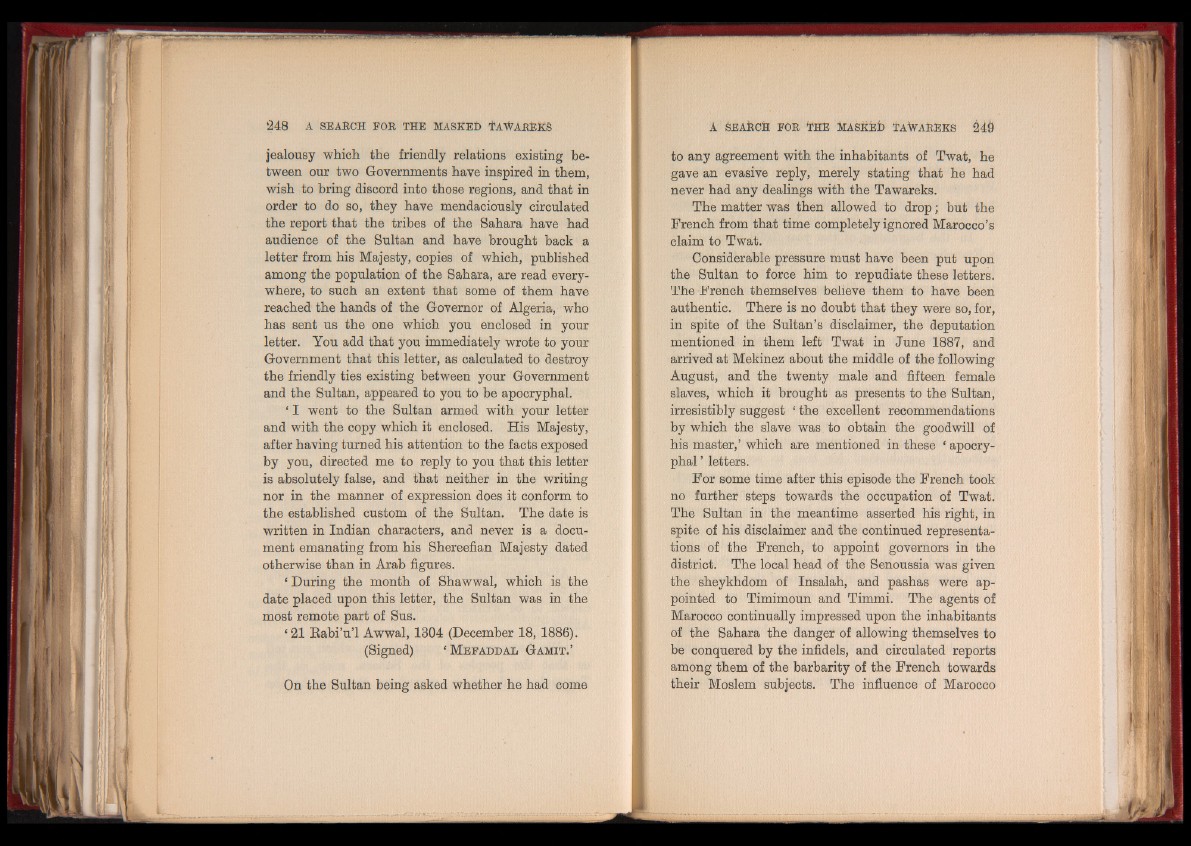
jealousy which the friendly relations existing between
our two Governments have inspired in them,
wish to bring discord into those regions, and that in
order to do so, they have mendaciously circulated
the report that the tribes of the Sahara have had
audience of the Sultan and have brought back a
letter from his Majesty, copies of which, published
among the population of the Sahara, are read everywhere,
to such an extent that some of them have
reached the hands of the Governor of Algeria, who
has sent us the one which you enclosed in your
letter. You add that you immediately wrote to your
Government that this letter, as calculated to destroy
the friendly ties existing between your Government
and the Sultan, appeared to you to be apocryphal.
‘ I went to the Sultan armed with your letter
and with the copy which it enclosed. His Majesty,
after having turned his attention to the facts exposed
by you, directed me to reply to you that this letter
is absolutely false, and that neither in the writing
nor in the manner of expression does it conform to
the established custom of the Sultan. The date is
written in Indian characters, and never is a document
emanating from his Shereefian Majesty dated
otherwise than in Arab figures.
* During the month of Shawwal, which is the
date placed upon this letter, the Sultan was in the
most remote part of Sus.
* 21 Eabi’u’l Awwal, 1304 (December 18, 1886).
(Signed) ‘ M e f a d d a l G am it .’
On the Sultan being asked whether he had come
to any agreement with the inhabitants of Twat, he
gave an evasive reply, merely stating that he had
never had any dealings with the Tawareks.
The matter was then allowed to drop ; but the
French from that time completely ignored Marocco’s
claim to Twat.
Considerable pressure must have been put upon
the Sultan to force him to repudiate these letters.
The French themselves believe them to have been
authentic. There is no doubt that they were so, for,
in spite of the Sultan’s disclaimer, the deputation
mentioned in them left Twat in June 1887, and
arrived at Mekinez about the middle of the following
August, and the twenty male and fifteen female
slaves, which it brought as presents to the Sultan,
irresistibly suggest ‘ the excellent recommendations
by which the slave was to obtain the goodwill of
his master,’ which are mentioned in these ‘ apocryphal
’ letters.
For some time after this episode the French took
no further steps towards the occupation of Twat.
The Sultan in the meantime asserted his right, in
spite of his disclaimer and the continued representations
of the French, to appoint governors in the
district. The local head of the Senoussia was given
the sheykhdom of Insalah, and pashas were appointed
to Timimoun and Timmi. The agents of
Marocco continually impressed upon the inhabitants
of the Sahara the danger of allowing themselves to
be conquered by the infidels, and circulated reports
among them of the barbarity of the French towards
their Moslem subjects. The influence of Marocco